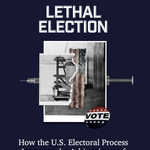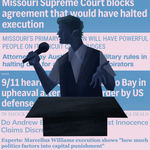DPIC Report: The 2% Death Penalty
How a Minority of Counties Produce Most Death Cases at Enormous Costs to All
DPIC Podcast: Discussions With DPIC
Authors of Death-Penalty Study Discuss Tennessee’s “Death Penalty Lottery”
Overview
A punishment that is administered in an arbitrary way — that is, imposed on some individuals but not on others, with no valid justification for the difference — is unconstitutionally cruel, just as an excessively harsh punishment is cruel. Arbitrary punishments also open the door to racial and other discrimination: if the sentencing authority has inadequate guidelines, prejudice can lead to harsher penalties for disfavored minorities.
If speeders who drove yellow cars were consistently ticketed but speeders who drove other colored cars were not, the application of the speeding law would be considered unfair, even if there were no mention of a car’s color in the law. In a death penalty system in which less than 2% of known murderers are sentenced to death, fairness requires that those few who are so sentenced should be guilty of the most horrific crimes or have worse criminal records than those who are not. A system in which the likelihood of a death sentence depends more on the race of the victim or the county in which the crime was committed, rather than on the severity of the offense, is also arbitrary.
The Supreme Court struck down all death penalty laws in 1972 because their application was arbitrary. In 1976, constitutional guidelines were instituted in an attempt to prevent such capriciousness in the future.
At Issue
More than forty years of evidence strongly suggests that the Court’s guidelines have been ineffective. Irrelevant factors such as race, poverty, and geography still seem to determine who is sentenced to death. Short of applying the death penalty in all murder cases (a path condemned by the Supreme Court), it may be impossible to devise rules that clearly delineate which crimes and which defendants merit death and that juries and judges are able to consistently apply.
What DPIC Offers
DPIC provides statistics on executions, death sentences, and death row that include demographic information on the defendant and victim. DPIC has also highlighted relevant studies demonstrating the continued arbitrariness in the application of the death penalty.
News & Developments
News
Nov 21, 2024
Alabama is Set to Execute Carey Grayson in its Third Nitrogen Gas Execution in 2024

Alabama is scheduled to execute Carey Grayson by nitrogen hypoxia on November 21, 2024, for his involvement with three other teens in the death of a hitchhiker in 1994, when he was 19 years old. Mr. Grayson’ execution would be Alabama’s sixth execution in 2024, and the third by nitrogen hypoxia. The state acknowledged Mr. Grayson was not the most culpable of the group, yet he is the only one of the four teens to face an execution. Mr. Grayson, and three others, were convicted of capital…
Read MoreNews
Nov 07, 2024
Idaho: Federal Judge Grants Stay of Execution for Thomas Creech; Defense Asks Court to Bar Death Penalty for Bryan Kohberger
After surviving a botched execution attempt in February, Thomas Creech was scheduled for execution a second time on November 13 in Idaho. On Wednesday, November 6, a federal district court issued a stay of execution to allow more time to consider Mr. Creech’s legal claims. The Idaho Department of Corrections announced that “execution preparations have been suspended” and the execution warrant will…
Read MoreNews
Nov 05, 2024
DPI Report Provides Valuable Context for 2024 Elections
As voters across the United States cast their ballots on election day, the Death Penalty Information Center’s July 2024 report, Lethal Election: How the U.S. Electoral Process Increases the Arbitrariness of the Death Penalty, provides valuable context on the intersection of politics and the death…
Read MoreNews
Oct 29, 2024
Hearings Begin on Constitutional Challenge to Kansas’ Death Penalty and Capital Jury Selection Process
On October 28, 2024, hearings began in Kansas’ Wyandotte County District Court regarding the constitutionality of the state’s death penalty and its capital jury selection process. A coalition of the ACLU Capital Punishment Project, the ACLU of Kansas, the Kansas Death Penalty Unit, and the law firms Hogan Lovells and Ali & Lockwood brought the challenge. The team argues that the death penalty, which is rarely used in Kansas, is “arbitrary, racially discriminatory, unreliable, and…
Read MoreNews
Oct 04, 2024
A Chance at Life, Withdrawn: When Politics Interferes with Plea Deals
American prosecutors have immense power and relatively unchecked discretion in capital cases. But in several recent cases, death-sentenced prisoners reached agreements with prosecutors that would have saved them from execution, only to learn that another official had interfered to block the agreement. Critics have argued that these decisions sow public distrust in the legal process and raise concerns that government officials may be exploiting death penalty cases for political…
Read More



